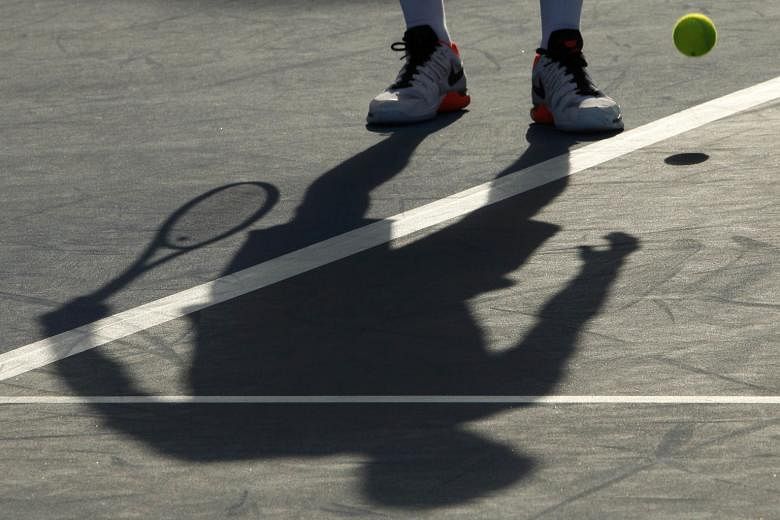It's never the crime, it's the cover-up. More than four decades on from Watergate, the phrase is becoming tired through overuse in a sporting context.
But the smell from the latest revelations tumbling from the game of tennis at the International Tennis Federation's sleepy south-west London HQ is in its own way just as concerning as the stench emanating from global football body Fifa's lair in Zurich or the desperate attempts to clean up the sorry mess left behind at the athletics governing body IAAF by Lamine Diack and his disgraced circle of henchmen in Monaco.
The Guardian's findings are particularly disturbing because they show the extent to which those who oversee the sport are struggling to adapt to the reality of the modern world that they helped create. As repeatedly noted during the recent sound and fury over match-fixing allegations that may not have necessarily added up to the sum of their parts but highlighted important wider issues, it is the vast disparity between the money on offer on the lower rungs of the tour and the riches at the top that contributes to serious concerns over the sport's integrity.
Novak Djokovic made US$21 million (S$29 million) in prize money last year and the player who finished the season ranked No. 100, Israel's Dudi Sela, earned US$315,000. But it is lower down the ladder, on the Futures and Challenger tours where players slog their way through the more remote fringes of eastern Europe, that the problem festers and grows like a cancer.
Once the ITF had signed a multi-million dollar deal with a data company , in this case Sportradar, that allows scores from the most minor matches and tournaments to be syndicated worldwide to betting sites, it was incumbent on it to also make sure its integrity unit was fit for purpose. If it could not ensure those tournaments were not at risk, and spend a small proportion of the US$14 million a year it brings in from the Sportradar deal on doing so, then it should not have made that data available.
And that it was its own umpires who were supposedly corrupted immediately begs a host of bigger questions. Most obviously, why didn't we know about this already?
The idea that investigations should be conducted in the dark, shrouded in secrecy and accompanied by an air of paranoia and unease can only add to the impression that the ITF is more concerned about the image of the sport than being seen to root out corruption without fear or favour.
None of these cases would be known about had concerned officials within the sport not blown the whistle to the Guardian. Even then, they spoke of an atmosphere of fear and intimidation that strongly suggested a culture of cover-up.
Thanks to them, we now know two umpires have been banned - one for life for contacting another official in an attempt to manipulate matches and another for 12 months (which appears extremely lenient) for passing on insider information and regularly placing bets.
In addition, four officials remain under investigation.
The ITF won't tell us why, but the Guardian understands it is alleged they were delaying the input of points on the official scoring system by up to 60 seconds in order to allow gambling syndicates to place bets and reap the benefits.
If proved, it is a serious matter of the highest order. Think of the justifiable outcry when Pakistani cricketers conspired to bowl three no balls in return for money. In that case, no bet was placed and no one defrauded. Yet three players ended up in prison.
In this case, four ITF officials are suspected of conspiring in a scam to give their conspirators the sort of edge that crooked gamblers dream about.
So called "court-siding" has long been an issue, not only in tennis but in other sports including football. Syndicates hope to take advantage of tiny lags between the live action and the televised broadcast to make good on improved odds. But, if the umpire is onside and the outcome of the point or game or set already known, then it's time to pack up and go home.
Sources at the highest level of the sport have accused the ITF of "dragging its feet" when it comes to investigating its own and suspect that it would far rather deal with the matter in-house. There are echoes here of any number of recent scandals - be it in cycling, football or athletics - where protecting reputations was a higher priority than rooting out corruption.
The buttoned-up denizens of the ITF might find those comparisons offensive, but they must surely realise that the landscape has shifted. Fans have gone from feeling uneasy about those who run their sports to outright hostility and scepticism.
It is for all sports to prove their probity and their determination to police the exploding online betting markets they benefit from commercially.
In the case of tennis the bout of scrutiny that overshadowed the opening of the Australian Open prompted a curious mixture of defensiveness and soul-searching, perhaps in both cases justified, among the alphabet soup of bodies that govern it. But it can only be hoped that it also focused minds.
The Tennis Integrity Unit urgently needs more independence, more staff, more transparency and more funding. It also needs to be allowed to get on with the job without roadblocks from those it is policing and conduct its business in the light rather than in the shadows.
Unfolding events in Zurich and Monaco should act as the starkest warning possible. Properly policing the sport's integrity should always trump fears of what it might find that could besmirch its image when rocks are kicked over. If those in charge can't see that, they need to give way to those who do.
THE GUARDIAN

